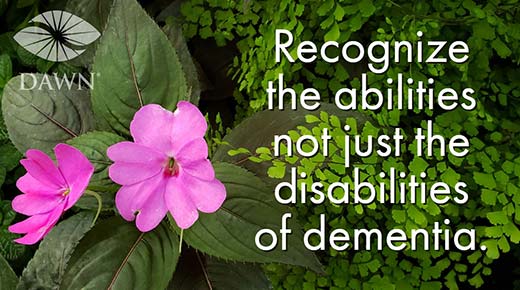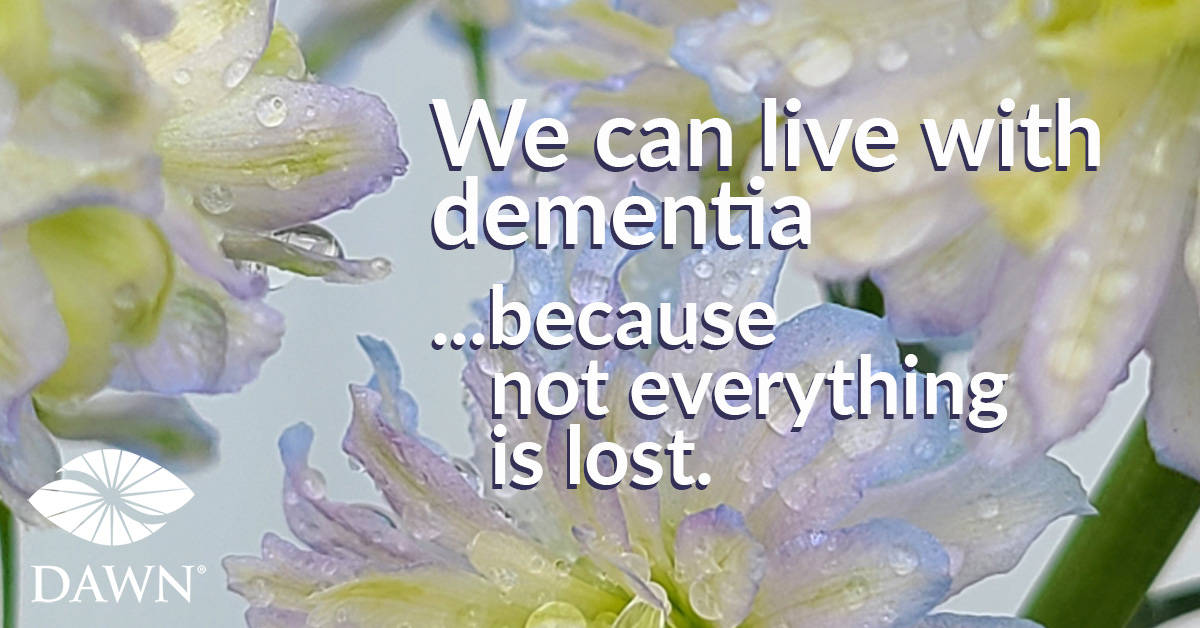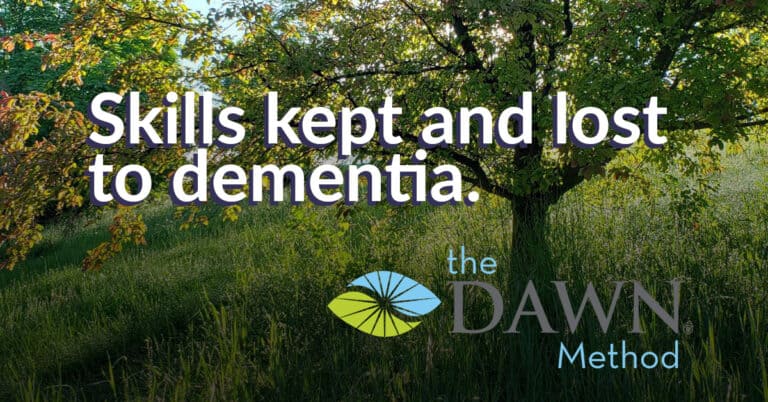
Back to your DAWN Guide to Caring for Someone with Dementia at Home
Skills Kept and Lost to Dementia
This table shows which sets of skills are kept and lost when we’re experiencing dementia. Knowing what our loved ones can and can’t do is essential. It’s the only way we can avoid embarrassing and offending them—and lower our own frustration and stress. The DAWN Method classes and books will help you understand what’s happening and learn new skills, so that you can maintain comfort and companionship with your loved one.

| Skills Lost to Dementia | Skills Kept with Dementia |
|---|---|
| Rational thought | Intuitive thought |
| Remembering self | Experiential self |
| Mindfulness | Mindlessness |
Losing our rational thought processes to dementia or Alzheimer’s is distressing
Unlike many people who become lawyers, Judy Cornish went to law school as an adult—after a childhood focused on music and art; her twenties spent working in marketing, graphic design and writing; and an undergraduate degree in literature and languages. To suddenly find herself required to use only rational thinking skills and analysis—rather than her intuitive thinking skills and creativity—was difficult. She found law school stressful.
When she began to spend time with people who were experiencing dementia, she remembered her own discomfort and saw them experiencing the same distress she had, but in reverse. She saw that they were losing their rational thought processes and struggling to navigate daily life with intuitive thought alone. And they were stressed, too.
We keep our intuitive thinking skills—our primary skills
Our intuitive thought processes enable us to recognize feelings and enjoy sensory stimulation. This means we retain the ability to enjoy the best things in life—that which is beautiful to us as well as companionship and feelings like joy and love. Studies have shown that people who score zero on a cognitive abilities test can still respond with compassion when they see someone in need.
When you spend time with people who are experiencing dementia, it’s important to understand the thought processes that they no longer have, but also to fill their lives with beauty in all its forms: music, nature, pleasing tastes and smells. Whether we’re experiencing dementia or not, we need physical exercise, social contact and sensory stimulation to keep our brains comfortable so we can relax in the evening and sleep at night.
We lose the remembering self, not the experiential self
In his book Thinking, Fast and Slow, Daniel Kahneman explains the existence of our two selves: the experiential and the remembering self. Although Kahneman is not thought of as an expert on dementia care, grasping this concept will greatly enhance your success as the care partner of someone experiencing dementia.

Just like our two very different thought processes, we all have an experiential and remembering self as well. Our remembering self fades away with dementia, while our experiential self remains. This means that when we’re experiencing dementia, even though we become unable to explain what just happened to us—or even to remember exactly what was done—we fully experience it. And, like anyone, our mood and actions reflect what we have experienced.
Mindfulness and mindlessness (aka attention skills)
The purpose of exercising mindfulness is to stay in the present—because beauty, companionship and all the good things in life are accessible in the present (not the past or future). We miss out when our minds and attention wander to the past and future, and away from what is right in front of us, ready to enjoy.
So, is mindfulness helpful with dementia? The short answer is oh yes: those who are the companions of people experiencing dementia benefit from mindfully choosing to be in the present with them. However, for those of us experiencing dementia, there is no need to try to be mindful, becausewe are losing the very skills that would distract us from the present.
The greatest truth about working with dementia is this: Dementia takes away our ability to leave the present, and our ability to shape the present, but not our ability to enjoy it.
Mindlessness is just as beneficial as mindfulness. We perform innumerabletasks and activities each day. Making a cup of coffee, setting the table for dinner, using a dishwasher or microwave—each task involves a series of steps that must be performed in sequence. We may have had to concentrate the first time or two that we performed the task, but after a few repetitions we no longer need to pay attention and can follow the steps without thinking. We have developed an automatic thinking script.
If the dishwasher breaks down and we buy a new one, we must again think about which buttons to push and how to best load it, and our healthy brains soon build a new script and we begin performing the task just as mindlessly as before.
However, when people are experiencing dementia, they lose the ability to learn new skills because they are losing memory and rational thought. For as long as they can remain in their familiar homes, their ability to function is enhanced by automatic thinking scripts. This is one reason why we see such a marked drop in functioning when someone experiencing dementia is moved.
This is an overview of the types of skillsets we lose and keep when we experience dementia.
Back to your DAWN Guide to Caring for Someone with Dementia at Home

